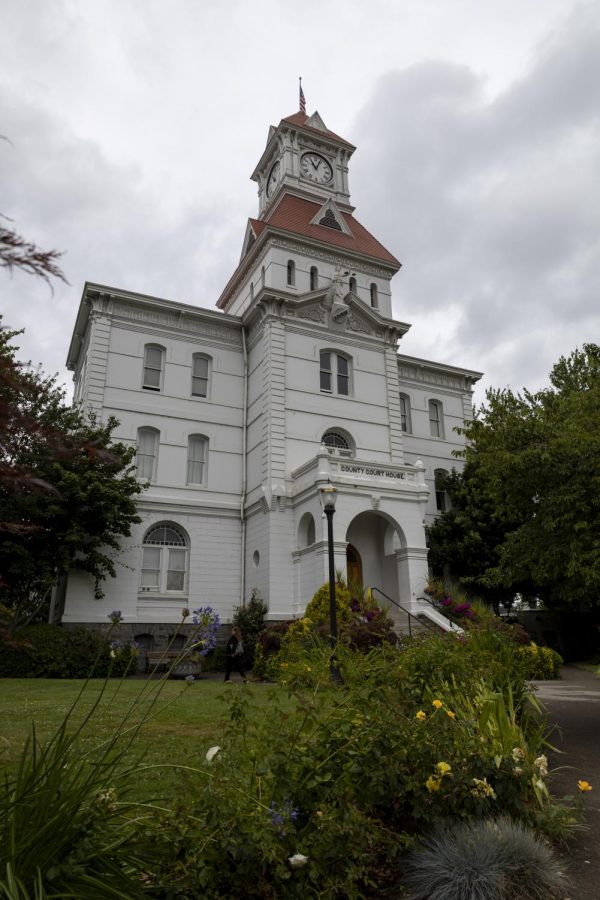Corvallis proceeds with new courthouse planning
The Benton County courthouse in downtown Corvallis on August of 2022. Benton County currently has no plans to become a Blue Zone.
August 20, 2022
The Benton County Board of Commissioners approved a $5.47 million offer for a near 30-acre parcel of land to be called the Community Safety and Justice Campus, which will house the new Benton County Courthouse.
The campus will be located along Highway 20, approximately one mile north of downtown Corvallis in the general industrial zone.
The grant for the facilities is allocated to not only the new courthouse, but also a district attorney’s office, emergency operations center, possibly a new sheriff’s office and a new correctional facility with additional beds and enhanced mental health services.
Between the courthouse staff and the DA’s offices there will be approximately 50 personnel who would relocate to the new courthouse.
Currently, the Records & Elections Department has already been relocated out of the historic courthouse and into Benton County’s Kalapuya Building in southwest Corvallis. The county judges and the court administrator, District Attorney’s Office and support staff will remain at the historic courthouse until the new facilities are completed.
The historic courthouse has ADA and seismic deficiencies, according to the Benton County website. Downum stated that the new courthouse will be designed according to the current building codes and earthquake standards.
“Anything built today has to be built to current code, which includes the most up to date seismic requirements,” said Nick Kurth, justice system improvement program manager.
The new courthouse will be up to date with current standards for safety. The new courthouse will be more accessible, and there will be a physical barrier between victims and those accused.
“Separation of victims and accused are all inherent issues with the historic courthouse that will be resolved with the new courthouse,” Kurth said.
Kurth said it was necessary to build a new courthouse as the historic courthouse has “outgrown its efficient purpose”.
“The historic Courthouse is too small,” said Brenda Downum, Benton County’s communications coordinator. “Built in 1888, it has serious safety issues, and can’t expand to meet modern courthouse needs.”
The Historic Courthouse Repurposing Committee is in the process of proposing new plans for the 134-year-old courthouse in downtown Corvallis, but has not brought forth any recommendations yet.
The bill HB 5006 is the state bill that appropriated the 50% matching funds, about $20.6 million, to three counties including Benton County to use in this legislative session for the new courthouse.
However, the state does not provide matching funds for the DA’s office. The estimated cost for the DA’s office is about $8 million for which the county will borrow bonds to fund. In total, the county will be borrowing a total of $33 million privately.
Nancy Wyse, Chair of the board of commissioners for Benton County, said that the bonds will be paid back with the revenue from the property tax they already get. These are tax-exempt bonds that are paid back with the general fund, usually over 30 years.
HB 5006 appropriated $2 million during the last legislative session for the planning purposes that have been completed.
In addition, $1.2 million are being appropriated to the Mental Health Crisis Center that will be built downtown Corvallis near the historic courthouse, but it will not be located on the Community Safety and Justice Campus.
“The Crisis Center and the correctional facility have been, and are still the top two priorities of the Justice System Improvement Program,” Kurth said.
The Crisis Center and the new courthouse will be built on the same timeline. The correctional facility is dependent on the passage of a bond measure that will be presented to voters in May 2023.
The state matching funds that Benton County received in this legislative session for a new courthouse have to be applied to the project in a maximum of three years upon their disbursement in April 2023. This deadline is tied to Internal Revenue Service rules.
After reviewing the design of the historic courthouse to redesign the courthouse with the DLR group, the conceptual design consultant, it resulted to not be practical from a structural or financial standpoint.
The historic courthouse being a historic resource has limitations on what is allowed to be remodeled.
In regards to sustainability, the new courthouse will attain at minimum the LEED Silver standards following statewide requirements.
“Once we get into design we will also explore potentially going beyond LEED Silver,” Kurth said. “There is opportunity on that site for enhanced solar.”
At this point in time there has not yet been a “true” design for the new facilities, other than size of the building and orientation with other buildings.
Anticipated complications of the project include obscurities relative to construction supplies and transportation which could affect timeline and budget. It is also uncertain what will be found on the site until early studies are done.
“A perfect example of that was stumbling on mammoth bones on one of the phases of the Reser stadium reconstruction,” Kurth said.
Kurth said the new facilities do not need to be built on the wetland but they are still a factor in terms of runoff and access to supplies. The Willamette River Greenway has been studied extensively and they do not anticipate issues with the Willamette River Greenway.
Another consideration for the new courthouse is a new collector road that will be built through the property from highway 20 back to Circle Blvd. The exact location of the new collector road has not yet been determined.
After an exhaustive study for locations of the new courthouse “this particular site always ranked at the top in terms of its amenities,” Kurth said. Although they had contemplated building on a site downtown, “there simply was not enough room,” Kurth said.
Although the new courthouse will not be in downtown Corvallis, it should not have a drastic impact on downtown Corvallis.
“People will continue to traverse through downtown from campus,” Kurth said.
The board of commissioners has done a criminal justice assessment bringing in a technical advisory committee, citizen advisory committee and executive committee.
“Our justice system is broken, and there are many facets to that,” Wyse said. “We are taking a comprehensive view on how to fix it.”



















































































![Newspaper clipping from February 25, 1970 in the Daily Barometer showing an article written by Bob Allen, past Barometer Editor. This article was written to spotlight both the student body’s lack of participation with student government at the time in conjunction with their class representatives response. [It’s important to note ASOSU was not structured identically to today’s standards, likely having a president on behalf of each class work together as one entity as opposed to one president representing all classes.]](https://dailybaro.orangemedianetwork.com/wp-content/uploads/2025/03/Screenshot-2025-03-12-1.00.42-PM-e1741811160853.png)
























